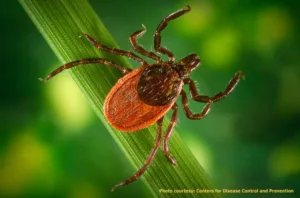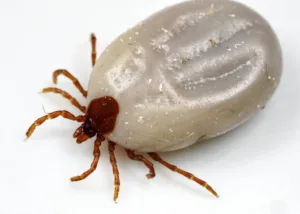Ticks are parasitic arachnids that feed on the blood of various animals, including mammals, birds, reptiles, and frogs. They are commonly found in wooded areas and fields and can attach themselves to people and animals that brush against trees and bushes.
Ticks can spread several dangerous diseases, including Lyme disease, Rocky Mountain spotted fever, and tularemia. Therefore, it’s essential to take precautions to prevent tick bites and reduce the risk of disease transmission.

Here are some key points to know about ticks:
1. **Nymph Stage:** Ticks undergo a complex life cycle, starting as larvae and eventually developing into nymphs and adults. Nymphs are smaller than adult ticks but still pose a risk of disease transmission. They have eight legs, unlike larvae, which have six legs.
2. **Identification:** Ticks are typically brown or black in color and have small bumps covering their bodies. They have small heads with mouthparts designed for cutting skin and feeding on blood. Ticks can vary in size depending on their level of engorgement after feeding on blood.
3. **Tick Species:** Common tick species include the deer tick, American dog tick, and brown dog tick. Each species has its own habitat and may carry different diseases. For example, the deer tick is known for transmitting Lyme disease, while the American dog tick can spread Rocky Mountain spotted fever.
4. **Prevention:** To prevent tick bites and reduce the risk of disease transmission, it’s essential to take steps such as wearing protective clothing, using insect repellents, and avoiding tick-infested areas. Regularly checking yourself, your pets, and your belongings for ticks after being outdoors is also crucial.
5. **Tick Control:** While it may not be possible to completely eliminate ticks from outdoor areas, there are measures you can take to reduce their presence. This includes keeping grass and vegetation trimmed, removing leaf litter and debris, and creating a tick-safe zone around your home.
6. **Natural Tick Control:** Some natural methods for controlling ticks include using essential oils like lemon oil and eucalyptus oil as repellents. Additionally, washing and drying clothes on high heat can help kill ticks that may be present on clothing.

Overall, awareness of ticks and their habits is essential for protecting yourself, your family, and your pets from tick-borne diseases. By taking preventive measures and staying vigilant, you can reduce the risk of tick bites and enjoy outdoor activities safely.





